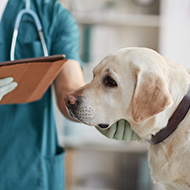
Human and animal health companies partner up to develop disease modifying drug.
Swiss animal health group Stonehaven Incubate has partnered with Regenosine – specialists in musculoskeletal regenerative therapies – to launch a new company focused on developing disease modifying osteoarthritis drugs for dogs.
The new company, named Vetosine, will produce adenosine-based treatments. Co-founder of Regenosine Dr Bruce Cronstein was one of the first researchers to highlight the role of adenosine in maintaining healthy joint cartilage.
Charlie Dawson, venture partner at Stonehaven Incubate, commented: “At the moment, veterinarians and pet owners have few therapy options for dogs with osteoarthritis beyond simple nonsteroidal anti-inflammatory drugs (NSAIDs), diet and exercise. Vetosine will provide a proven disease modifying drug that will strengthen clinical outcomes and improve the pet’s quality of life.”
Dr. Siddhesh Angle, co-founder and CEO of Regenosine, said: “We have now developed proprietary formulations for adenosine replacement which have demonstrated disease modifying outcomes in gold standard preclinical models for osteoarthritis.”
“While we endeavour to make this first-in-class therapy a success for human medicine, we are very excited to partner with Stonehaven Incubate to expand its horizon into the animal health space.”
According to Stonehaven Incubate, Vetosine will have an exclusive global license to develop the new technology in animal health, while Regenosine will maintain its focus on developing the same technology for the human health sector.



 The latest
The latest